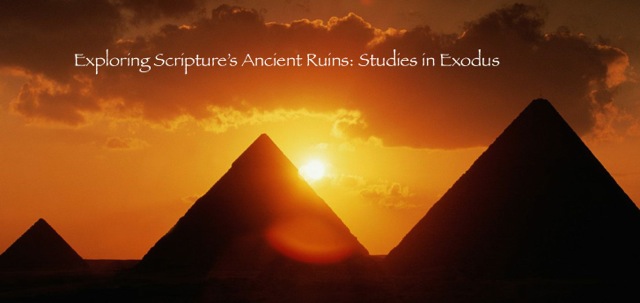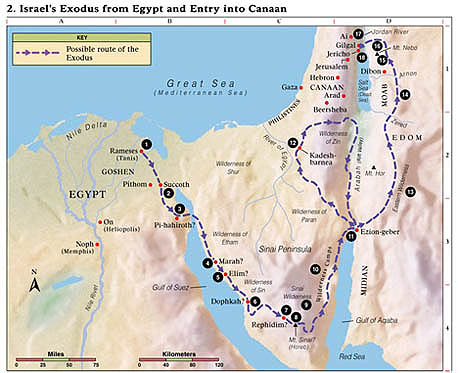©1998-2015
Fellowship
Life of Moses
Lesson 22
The Path Less Traveled…
(Reminding, Teaching, Worshiping and Trusting)
Ex 13:1ff
2.22.15
Introduction… In a world that can often times seem very discouraging, what best holds you faithful or accountable in your Spiritual journey or walk with God: prayer? Sunday worship? Daily devotional reading of the Bible? Teaching others? Small group Bible study? Inspirational music? A good friend? Your mate? Who or what best holds you accountable?
One of our church kids asked me for a recommendation to go to Christian-based prep school. I asked him why? Without hesitation, he answered that he believed it would be for advantageous for him Spiritually. When I asked why? he answered that it was not easy being a Christian at his local public school. When I asked why was this? he seemed to imply that there is fear and intimidation he must face about when he is openly honest about his faith or belief in God. So sad, but not unexpected.
Now whether he gets into his Christian prep school or not, and whether it works out as he hopes for, who knows, but I do know the kid is thinking, and he is seeking to think through a biblical-Spiritual lens. He wants to talk about God without threat, and who wouldn’t. Even in the sixth grade, that’s pretty cool and seemingly somewhat rare.
How many of us filter daily existence through this type of Spiritual lens—what allows me to discuss and talk about my faith freely, without fear of rebuke or repudiation
“Two roads diverged in a wood, and I–I took the one less traveled by. And that has made all the difference.” Taken from “The Road Not Taken” by Robert Frost.
In a passage that at first glance appears fairly sedate compared to what we have been experiencing here lately, i.e. devastating plagues and miracles powerfully delivered by the hand of God upon a stubborn, polytheistic Egyptian dynasty (as summarized in the review below), there lies embedded some very powerful and practical tools for Spiritual accountability. See if you can find them and perhaps label them. Then compare them to what I have listed within my own applicational truths near the end of this study. Seek to walk away with something…something that counts…something that repeatedly and consistently holds you Spiritual accountable and in the process contributes to your ongoing Spiritual vitality and longevity.
Review…
What were the devastating costs required for Yahweh God to redeem (buy back), his chosen people, the Children of Israel, via their miraculous Exodus (way out) from harsh Egyptian enslavement?
• Moses makes 12 appearances before Pharaoh.
• There are 39 mentions of Israel’s “release” or “deliverance” in order to celebrate a festival to Yahweh God in the desert.
• 7 times Yahweh predicts that Pharaoh will not listen to Moses.
• In order to motivate Pharaoh to release his enslaving grip upon the Israelites, Yahweh unleashes 10 Consecutive, Pervasive and Devastating Curses upon Egypt.
• 10 times the text clearly says that Yahweh God distinguishes between Israel and Egypt with respect to the plagues’ devastating affects.
• Neither Pharaoh’s diviners nor his gods are any match for Yahweh’s mighty hand.
In delivering Israel from Egypt, Yahweh God could be defeating as many as 118 Egyptian deities.
http://en.wikipedia.org/wiki/List_of_Egyptian_deities
It is also interesting to note that Yahweh’s last and greatest curse against Egypt, the curse of Egypt’s firstborn, is not just directed against the firstborn of man and beast, but also “against all the gods of Egypt” (Ex. 12:12).
• Under intense national pain and pressure, on several occasions, Pharaoh will express a momentary remorse and contrition for not releasing Israel to worship.
Pharaoh is momentarily contrite (3x) while admitting sin (2x) and asking Moses to prayerfully intercede on behalf of Pharaoh’s disobedience to Y. for not releasing the Israelite as commanded by Y. in order that they may fully serve Y. God in the desert with sacrifices (4x); Once Pharaoh even asks for forgiveness.
• 7x Pharaoh will declare that Israel can go and sacrifice (after plagues 2, 4, 7, 8, 9 [2x]; 10);
• But because of the hardening of his heart, Pharaoh will change his mind and recant his promise 4x;
• In fact, there are 17 references to the “hardening” of Pharaoh’s heart.
Moses makes mention of this “hardening” a total of 17 times, with 9 references being attributed directly to Yahweh’s divine intervention, 6 neutral occurrences, which could be inferred to as being attributed to Yahweh and 3 more occurrences in which Pharaoh and his servants are given the credit of “hardening” their own hearts.”
• 4x Pharaoh unsuccessfully attempts to make bargain with God or Moses so that not all of Israel will go and worship.
• So what’s the point to all this protracted salvific drama?
So with this one protracted drama acted out on history’s stage, God reveals the truth concerning God and man. God is big; man is small. Though for a time, it may seem that man can be God, when man attempts to play God, he is ultimately crushed by God, and those who chose to keep God, God and man, man, or those that ally themselves with God through faith, with will not only be delivered from corrupt man, but will be rewarded for their trust.
Pray
Read the Passage two-three times…
Ask Questions (no answers)…
13:1 Then the Lord spoke to Moses, saying,
2 “Sanctify to Me every firstborn, the first offspring of every womb among the sons of Israel, both of man and beast; it belongs to Me.”
Interesting on the eve before this the last and greatest plague, the plague in which Egypt’s firstborn will be required of God and that ultimately will cause Pharaoh to finally capitulate before the LORD God and release all the Children of Israel to go and worship the LORD, the LORD establishes a precedent—the setting apart of all the firstborn of Israel. It is as if the LORD wants to remind Israel from here on out the actual skyscraper costs of what it took to extract Israel out of Egypt.
3 Moses said to the people, “Remember this day in which you went out from Egypt, from the house of slavery; for by a powerful hand the Lord brought you out from this place. And nothing leavened shall be eaten.
No leavened bread and all your firstborn of man and beast belong to God, two reminders of what occurred on this day into perpetuity.
4 On this day in the month of Abib, you are about to go forth.
What month is Abib? The Spring?
5 It shall be when the Lord brings you to the land of the Canaanite, the Hittite, the Amorite, the Hivite and the Jebusite, which He swore to your fathers to give you, a land flowing with milk and honey, that you shall observe this rite in this month.
6 For seven days you shall eat unleavened bread, and on the seventh day there shall be a feast to the Lord.
The Feast of Unleavened Bread…does this occur after Passover night, in which unleavened bread is also eaten? So is this eight days of eating unleavened bread?
7 Unleavened bread shall be eaten throughout the seven days; and nothing leavened shall be seen among you, nor shall any leaven be seen among you in all your borders.
The complete elimination of leaven…why? Originally, on Passover, Israel ate unleavened bread as a symbol that their imminent leaving of Egypt…the bread didn’t have time to rise. Why for this extra week?
8 You shall tell your son on that day, saying, ‘It is because of what the Lord did for me when I came out of Egypt.’
9 And it shall serve as a sign to you on your hand, and as a reminder on your forehead, that the law of the Lord may be in your mouth; for with a powerful hand the Lord brought you out of Egypt.
Is this reminder the unleavened bread or is this a literal symbol on their hand and forehead?
10 Therefore, you shall keep this ordinance at its appointed time from year to year.
11 “Now when the Lord brings you to the land of the Canaanite, as He swore to you and to your fathers, and gives it to you,
12 you shall devote to the Lord the first offspring of every womb, and the first offspring of every beast that you own; the males belong to the Lord.
13 But every first offspring of a donkey you shall redeem with a lamb, but if you do not redeem it, then you shall break its neck; and every firstborn of man among your sons you shall redeem.
By sacrificing a lamb, meaning sacrifice the lamb, and you keep the donkey’s firstborn? Break its neck, meaning either you redeem the donkey’s firstborn with a lamb or you kill the donkey’s firstborn? How do you redeem a man’s firstborn?
14 And it shall be when your son asks you in time to come, saying, ‘What is this?’ then you shall say to him, ‘With a powerful hand the Lord brought us out of Egypt, from the house of slavery.
15 It came about, when Pharaoh was stubborn about letting us go, that the Lord killed every firstborn in the land of Egypt, both the firstborn of man and the firstborn of beast. Therefore, I sacrifice to the Lord the males, the first offspring of every womb, but every firstborn of my sons I redeem.’
Only the firstborn males, not the females?
16 So it shall serve as a sign on your hand and as phylacteries on your forehead, for with a powerful hand the Lord brought us out of Egypt.”
What’s a phylactery? A small box tied to one’s head? Did people really wear one of these or was the sign of the firstborn just meant to be a symbol of what a phylactery was supposed to function as or represent?
17 Now when Pharaoh had let the people go, God did not lead them by the way of the land of the Philistines, even though it was near; for God said, “The people might change their minds when they see war, and return to Egypt.”
For fear of the Philistines and turn around and go back to Egypt? But how would Egypt have handled that? After having lost all their firstborn, no doubt, the Egyptians would have not been happy and probably taken out their grief and frustrations upon the Israelites.
18 Hence God led the people around by the way of the wilderness to the Red Sea; and the sons of Israel went up in martial array from the land of Egypt.
Military array sounds like the Israelites are preparing for battle?
19 Moses took the bones of Joseph with him, for he had made the sons of Israel solemnly swear, saying, “God will surely take care of you, and you shall carry my bones from here with you.”
A powerful symbol, no doubt, and the end of a Israel’s history in Egypt that had begun when Jacob, or Israel’s next to the youngest son, Joseph, had been sold into slavery in Egypt. Now four centuries later, the bones of both Israel and Egypt’s savior centuries before, now return to his homeland. Israel is going home.
20 Then they set out from Succoth and camped in Etham on the edge of the wilderness.
21 The Lord was going before them in a pillar of cloud by day to lead them on the way, and in a pillar of fire by night to give them light, that they might travel by day and by night.
Was this a large cloud that they followed in the day? Did they also travel at night? The pillar of fire must have been an impressive sight.
22 He did not take away the pillar of cloud by day, nor the pillar of fire by night, from before the people.
Having redeemed and delivered his people from Egyptian slavery, God is not abandoning his people. He is with them all the time, all the way.
Who’s?
Where’s?
When’s?
What’s?
• In light of this great redemption, Yahweh demands forever all of Israel’s firstborn and for the week following Passover, the only type of bread to be made and eaten is unleavened or unrisen bread—bread made without the rising agent of yeast.
• In addition, they are to tell their sons the source of this law or tradition from here on out. In other words, these two symbols commemorate and tell the story of Israel’s exodus from here on out.
• As the people leave Egypt, God will not lead them along the coast to their Promise Land, the obvious short way, because instead of fighting, the Israelites might just decide to return back to Egypt, so God, instead of leading them further from the Egyptians leads them, prepared and arrayed for battle, along through the desert to the Red Sea, closer to Egypt.
• And we know that it is God leading them because of a constant cloud that accompanied the Israelites by day and a pillar of fire by night.
Summary… As God leads the Children of Israel out of Egypt, besides Passover, they are given two additional ritualistic, commemorative laws to observe and teach their children into perpetuity which will serve as a reminder of how God delivered the Children of Israel out of Egypt—all firstborn males belong to God and for one week after Passover, the Children of Israel will continue to eat only unleavened bread.
Bottom line… God directs his delivered children both directionally and commemoratively as they leave Egypt.
Why’s? Why did God include this passage in his timeless word? Or What do I learn about God? Life? People? Myself?
• People forget quickly. History, even after a few years or decades, is sometimes difficult to recover, much less after centuries or millenniums, so it is no wonder God uses three important, ongoing and costly symbols to cause his people to remember. And remember they have done, even now 3400 years later. Amazing.
• The setting apart of their firstborn no doubt reminds them the deadly sacrifice that was required to redeem Israel from the stubborn yoke of Egypt’s sinful oppression. And because peace and prosperity means that most of us enjoy leavened bread that has time to rise, eating unleavened bread for eight days every year also drives home the point that Israel’s rescue was overnight and instantaneous. It was an undeniable miracle or proof of God, his power, his existence and his morality or righteousness, all things that man needs constant reminding of if his life is not to disintegrate into self-centered evil and vanity.
• The teaching of the children is important if the truth, this story, this moment or a love, devotion and respect of God is to continue from generation to generation.
• Israel’s giving back to God their best…their firstborn…reminds us all that all that we have belongs to God, and that to keep any of it back seduces us into a subtle, destructive and insidious idolatry. Just as Abraham must have learned when God asked him to sacrifice his son of the covenant with God, Isaac, that only by keeping God first and all else a distant second, is there any hope for any of us in not becoming or creating our own false and ultimately failed religious or man-made idols or gods–idols and gods, be they a person, including a mate, child, parent, leader or friend, or a place or thing, which in turn can then be commandeered by the spiritually demonic (1 Cor. 10) to manipulate man into worshiping what will not save him and certainly, in the end, seeks to destroy him.
• It would seem more logical for God to lead us the shorten and quickest way home, even towards an unknown enemy, than right back into the waiting arms of a known enemy, but God has his purposes. Be obedient, trust the Lord and following his leading.
• God is always with us. Always. Through his Spirit, who indeed uses prayer, his word, angels, the Body of Christ, even experiential wisdom God remains ever constant with us to lead us through the trials, tribulations, pitfalls, dangers and temptations of a fallen, deadly and imperfect world.
So What’s? How does this truth personally apply to one of my life’s struggles?
2015 Application…
Thanksgiving… In not going to Daytona for the races, I believed God used me for other purposes, including some important and critical counseling that otherwise, would not have happened because I would not have been here at the right moment.
Struggle… Despite the freedom of NOT teaching this week, because I had been scheduled to go to Daytona, as well as, having many wonderful and productive ministry experiences, there are other nagging concerns that attempt to rob my peace and joy, including: the recent ice and snow we have had to deal with, people’s serious health issues and concerns and our daily dealings with Rhonda’s mother’s rapidly deteriorating short-term memory. And yet on a much larger, but ever-present scale, fearing the church’s seemingly marginalized role in: a) a culture that seems hell-bent on pursuing its own unrestrained self-indulgence that will no doubt lead to its own ultimate self-destruction, including, but not limited to, the rapid liberalizing and redefining of one of one of its most sacred and traditional morals and values–marriage–both from a conventional and non-conventional point of view, while b) at the same time, cautiously wondering in the back of my mind, if the once vastly under-estimated ISIS’ is a spiritual harbinger of something much more dark and apocalyptic on the world horizon, and particularly where the church is concerned?
So in essence, if it hasn’t already begun (and I think it has) God’s representative presence of peace, joy, truth, love and hope on earth, the church, is about to get squeezed and persecuted from two very different, but adversarial directions—the liberal West’s rapid, self-ingratiating moral deterioration as juxtaposed by a zealous, radical, religious Eastern Islamic caliphate bent on using whatever means necessary, including death, fear and persecution, to bring about an Islamically-defined kingdom of God.
It’s a lot to think about or trust God with for a poor, country minister such as I…
Truth…1) We all need, even symbolic, active engagement or reminders of God’s redeeming deliverance from sin and evil, including the cross or baptism and communion; the Scriptures themselves, memorized scriptures; songs of praise and worship; phrases, mottos, teachings and sayings of truth; both communal and personal worship, prayer, testimony, mutual rebuke and encouragement; 2) passing the truth down to our children is vitally important for both the church and the individual’s Spiritual longevity and health; 3) sacrificial worship, in which we give all of who we are, what we have, have experienced, fear and hope for, both regulates and protects us from our own insidious self-delusion, false and superficial worship, idolatry and destruction; 4) God’s route may not always be the most direct, but it is God’s route for our personal Spiritual best interest, and therefore we ought not to complain, but live, trust, hope and love in it; 5) and no matter what, via his Spirit (Romans 8), he has promised to be with us.
Cyclical spiritual reminders, passing on the Spiritual truth to our children, true protective sacrificial worship, God’s constant Spiritual presence and his indirect path are all crucial elements to the both the believer and the congregation’s Spiritual vitality and longevity.
Application… Ongoing Spiritual reminders, the faithful passing on of his truth…his story, sacrificial worship and rejoicing in his indirect path to our Spiritual destiny via the presence of his constant Spirit within my mind and heart at all times…these are Spiritual antidotes that I will use right now, tomorrow and the next day and the next day after that to fight off the foxes of fear and worry that threaten my vineyard. Can I remember these? At this moment, my soul is heartened. The war is on. What do I believe? What do I fear? God or culture? The choice is mine. The choice is yours…remind, teach, worship…rejoice and trust…in his ongoing presence and indirect path.
What about you? Struggle? Truth? Application?
Scripture quotations taken from the New American Standard Bible®, Copyright © 1960, 1962, 1963, 1968,1971, 1972, 1973, 1975, 1977, 1995 by The Lockman Foundation Used by permission.” (www.Lockman.org).





